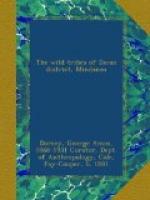Datu Tongkaling is the most industrious man in the tribe. He does not hesitate to work in the rice fields, to aid in the house-building or to take his turn at the forge, neither will he tolerate any loafing on the part of his followers. While in most instances he mingles freely with his people he never eats with them. His wives, children, and guests eat from a long row of dishes set on the floor, but the datu takes his food alone at a considerable distance from the others.
The balance of the people can be roughly divided between freeman and slaves, but slavery here is of such a mild type, and the members of that class become so quickly merged into the tribe that the lines cannot be closely drawn. Women and children secured in raids become the slaves of their captors, and may be bought and sold, or pass by inheritance, like other property. It is considered proper for a man to live with his slave without marrying her, but should she become pregnant she is usually given her freedom at once; if not then, she is certain to be upon the death of her master, while her offspring are free and legitimate heirs. Children born to a slave couple remain in their class, as do those born to a slave mother and a man not her master. These slaves are treated with kindness and consideration and seldom try to make their escape. In fact it is often difficult to pick out the members of this class from the other members of the family.
The chief aim in life of the man is to have the right to wear the blood-red clothing and to be known as magani. As stated earlier in the paper, this term is applied to a man who has killed two or more persons. He is then entitled to wear the peculiar chocolate-colored head covering (Plate XXV). When his score has reached four he can don blood-red trousers, and when he has six lives to his credit he is permitted to wear the complete blood-red suit and to carry a bag of the same color.[1] From that time on his clothing does not change with the number of his victims, but his influence increases with each life put to his credit. It is said that formerly, at Digos and Bansalan, a man who had killed twenty or more was known as gemawan, and was distinguished by a black hemp suit. This claim to the black clothing is no longer respected, and such garments are worn by any who desire them. The man who has never killed a person is called matalo, a rather slighting term signifying one who has no desire to fight but remains at home with the women. A man who kills an unfaithful wife and her admirer may count the two on his score. He may also count those of his townspeople whom he has killed in fair fight, but unprovoked murder will be punished by the death of the offender. The candidate for magani honors may go to an unfriendly town, or to a neighboring tribe, and kill without fear of censure from his own people.
[l] This is the rule at Cibolan. At Malilla and Digos, the kerchief may be worn when one life has been taken, the trousers for two, the coat for three, and finally the sack for four.




